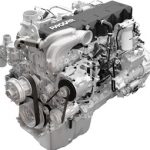Family wagon
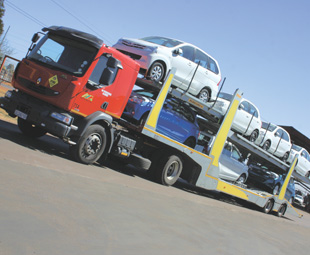
The car-ferry company Motorvia is South Africa’s oldest and largest; growing into the family it is today has allowed it to maintain that leadership. GAVIN MYERS finds out how half of all new vehicles hitting our roads every month get from plant (or dock) to pavement.
A look at the monthly new-vehicle sales figures issued by the National Association of Automobile Manufacturers of South Africa (Naamsa) reveals that the local new vehicle market is alive and well, despite cries of tough times all round in recent years.
But how did July’s 50 000 new passenger and commercial vehicles make their way onto dealership floors? What happens to the vehicles before they hit the road? Well, over half of them were entrusted to the capable hands of car-ferry company Motorvia, a proudly South African “family” company.
Following a management buyout in 1993, director Christo van Niekerk, chairman and majority shareholder James Thompson, and financial director Jakes van der Merwe, have run Motorvia with a strong family focus. All three have experience in the car-ferry industry stretching back to the 1970s.
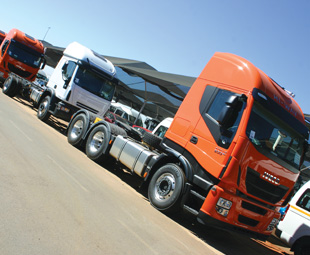 After completing his university studies, Van Niekerk started right at the bottom loading trains for Volkswagen in Port Elizabeth with a team of drivers. Van der Merwe came from a banking background and started off doing accounting and auditing at Motorvia. He then progressed to the position of group accountant before the buyout.
After completing his university studies, Van Niekerk started right at the bottom loading trains for Volkswagen in Port Elizabeth with a team of drivers. Van der Merwe came from a banking background and started off doing accounting and auditing at Motorvia. He then progressed to the position of group accountant before the buyout.
Thompson, who left his job as a qualified teacher to “drive cars” (as Van Niekerk puts it), joined the company as a convoy supervisor – in the days before cars were delivered on the back of a truck – and eventually became a shareholder of the previous company before the buyout.
Motorvia itself has roots going back to 1963 when Pienkes du Plessis started delivering Toyopet bakkies for Toyota to its dealers.
Bringing their years of experience together, Van Niekerk, Thompson and Van der Merwe have made Motorvia the trusted service provider it is today.
Motor manufacturers such as Ford and Mazda entrust all their distribution and exports of the Ford Ranger to Motorvia; as do Jaguar-Land Rover, Mahindra and Iveco. The company handles around 50 percent of car ferry and storage requirements for Toyota, Volkswagen/Audi and General Motors (also providing the import/export services to Toyota and Volkswagen). It also includes BMW (and its 3 Series exports), Peugeot-Citroen, Geely and JMC in its client base.
In total, Motorvia moves 26 000 new vehicles in and around South Africa a month. The company’s flagship depot, along the R21 freeway in Kempton Park, Gauteng, caters for 15 000 vehicles in total, with storage space for 11 500 units.
It’s one thing to read those Naamsa figures every month, but quite another to actually see a good portion of those vehicles lined up and waiting to find their way to their new home. Motorvia can warehouse the vehicles for anything from one to 360 days, also providing a vehicle preservation service every 30 days.
The company’s 290 car-carrying trucks (of which 80 are dedicated to the Kempton Park depot) run to, from, between and around the company’s depots; the others are situated in Uitenhage adjacent to the Volkswagen plant, in Durban adjacent to the Toyota plant, in Silverton and Rosslyn at Ford and BMW’s depots respectively, and in Cape Town. And with its current property bursting at the seams, an additional facility to cater for 2 000 cars has been opened in Durban opposite the existing Toyota plant facility.
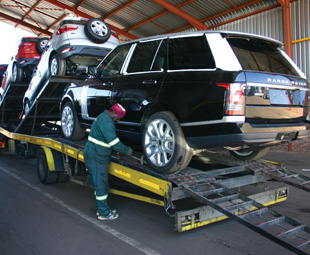 Logistics manager Dani Diedricks explains the logistics of the operation: “We receive electronic notifications from the original equipment manufacturers (OEMs) advising what cars need to go where. The stock is then prepared for the planners, who set the schedules for the trucks and allocate the cars to the correct trucks. Once the trucks are loaded and ready to go, the vehicles’ papers are scanned for security purposes. A team of controllers then plans and monitors the car carriers every hour, to make sure things are happening according to the planned schedule.”
Logistics manager Dani Diedricks explains the logistics of the operation: “We receive electronic notifications from the original equipment manufacturers (OEMs) advising what cars need to go where. The stock is then prepared for the planners, who set the schedules for the trucks and allocate the cars to the correct trucks. Once the trucks are loaded and ready to go, the vehicles’ papers are scanned for security purposes. A team of controllers then plans and monitors the car carriers every hour, to make sure things are happening according to the planned schedule.”
Of course, with such valuable cargo being the core of its business, the management of Motorvia does not take any chances. In addition to carrying comprehensive insurance policies, all motor vehicles delivered are linked to the trucks’ satellite tracking, with some having mobile trackers installed for the duration of the delivery – all at the company’s expense. When a truck is scanned out all the vehicles on that truck are acknowledged on Motorvia’s internal system. Then, when the truck nears its destination, a designated person will get an SMS advising that the delivery is on its way and a time of arrival.
Van Niekerk points out that, in this industry, technology has taken over. “We’re dependant on these systems for tracking and geo-fencing; without them, running our business is not possible,” he says. With a keen interest in IT, Van Niekerk was Motorvia’s IT director before he, Thompson and Van de Merwe, took ownership of the business. In that role Van Niekerk was a central figure in the design of Motorvia’s own unique, internal system.
“Hijacking is a huge problem in our industry,” notes general manager William du Plessis. “Our drivers have been followed and we can’t always stop inside a client’s facility to offload. So we have now employed five reaction units to accompany trucks going into identified ‘hot-spot’ areas,” he says reassuringly. In addition to keeping an eye on the valuable cargo, these private investigators also monitor the drivers off-loading procedures, pointing out mistakes and offering suggestions for improvement.
All new drivers are checked for a criminal record, but Du Plessis is quick to point out that driver turnover is very low. “Our drivers are very loyal and they get paid and treated very well. We have drivers who have been here for over 30 years,” he says.
Du Plessis explains that the company’s drivers don’t just drive: they are responsible for loading and unloading their own vehicles. The company has a driving instructor based in Durban, as well as on-site wellness clinics.
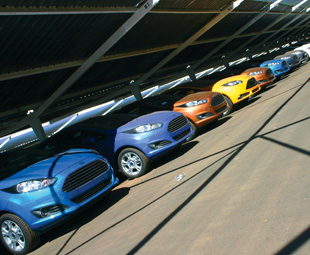 “That’s part of the reason we became RTMS compliant,” he notes. “RTMS is of course focused on the driver – we were the first company in the motor ferry industry to obtain compliance, over two years ago.” The company certainly takes the quality of its business very seriously, being ISO 9001-accredited. It also recently embarked on ISO 14001 and 18001 accreditation. “We’re forever striving to better ourselves,” says a proud Du Plessis.
“That’s part of the reason we became RTMS compliant,” he notes. “RTMS is of course focused on the driver – we were the first company in the motor ferry industry to obtain compliance, over two years ago.” The company certainly takes the quality of its business very seriously, being ISO 9001-accredited. It also recently embarked on ISO 14001 and 18001 accreditation. “We’re forever striving to better ourselves,” says a proud Du Plessis.
The car-ferry industry has embarked on a Performance Based Standards (PBS) programme which, if successful, will allow car carriers to operate at maximum carrying capacity. “This will enable us to see even more improvements in our quality and performance standards, while allowing us to get around a slightly sticky legislative problem,” says Du Plessis. This is the fact that the Department of Transport has revoked the right for new car carriers to apply for abnormal load permits, effectively cutting 25 percent of potential payload.
However, the company has taken proactive action to keep its deliveries running on schedule with the required number of vehicles; recently investing in 20 Italian Rolfo trailers which allow a maximised payload and load configurations as close as possible to the 4,3 m height restriction – an investment well worth the rand/euro exchange rate.
With more than 60 years’ experience in car-carrier equipment manufacture, Rolfo was a perfect candidate to join the Motorvia family. Its trailers offer a fully galvanized chassis; pneumatic suspension; anti-lock brakes; a split top deck in the Blizzard 6 Afro (one of the models employed by Motorvia) with independent front part; various hydraulic lifting decks and an on-board elector hydraulic power pack.
The newly designed Blizzard 6 Afro is the first of the international brand of car carriers to attain PBS approval in South Africa. Rolfo was locally established in 2009 and is currently in its third phase of development that will culminate in the commissioning of a state-of-the-art, R60 million manufacturing plant in the Rosslyn Automotive Supplier Park.
Of course, state-of-the-art trailers are nothing without similar means of motivation, and so Motorvia is currently going through a fleet renewal programme. Taking into account factors important to the car ferry industry, such as roof and chassis height, the company has recently added 10 new Hino 500s, eight Volvo FM400s (with another four on order), 12 Iveco Stralis 430 car transporters, 17 Renault Midlum 280s and six Renault Premium Lander 380s (with another eight on order).
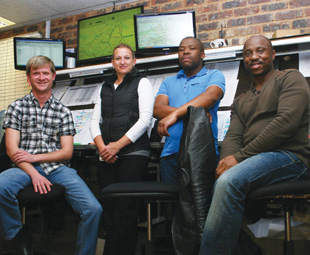 Motorvia is especially happy with the performance of the Renault Midlums it has begun running. The 209 kW (280 hp), 18-tonne 4×2 truck tractors have proved very economical coupled with the Blizzard trailers. The Midlum’s good fuel-consumption and driver comfort has proved viable for Motorvia in the long run. The company is currently running 10 rear air suspension units, and seven mechanical rear suspension units, and is in the process of adding the bigger 283 kW (380 hp) Premium Lander to the fleet as well.
Motorvia is especially happy with the performance of the Renault Midlums it has begun running. The 209 kW (280 hp), 18-tonne 4×2 truck tractors have proved very economical coupled with the Blizzard trailers. The Midlum’s good fuel-consumption and driver comfort has proved viable for Motorvia in the long run. The company is currently running 10 rear air suspension units, and seven mechanical rear suspension units, and is in the process of adding the bigger 283 kW (380 hp) Premium Lander to the fleet as well.
“The fleet is now being rapidly renewed to comply with PBS,” says Van Niekerk. “We have to do the best we can in the small envelope provided and the new trucks have improved our key performance indicators (KPIs).”
These KPIs represent one of the biggest changes to the industry over the years, Van Nikerk points out. “The change in quality and safety has been tremendous. Fifteen years ago an incident rate – even just a stone chip – of three or four percent was common. Today it’s almost unacceptable to have anything approaching one percent.” Motorvia aims for a KPI target of 0,5 percent.
“The industry has become extremely competitive, and that’s a worldwide phenomenon,” says Van Niekerk. “But it’s been for the better – we’ve become a leaner company and have been forced to work smarter and become a more tightly knit family.”
Little wonder Motorvia has remained one of the few private companies in the business. You just can’t replace family.
Published by
Focus on Transport
focusmagsa


